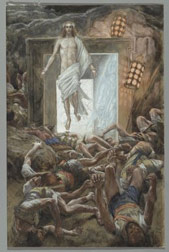By Gerald M. Fagin, SJ
From Putting on the Heart of Christ: How the Spiritual Exercises Invite Us to a Virtuous Life
 Three significant truths rooted in the Resurrection open a window to the grace and virtues of the Fourth Week [of the Spiritual Exercises]. In particular, they highlight some of the reasons for our joy.
Three significant truths rooted in the Resurrection open a window to the grace and virtues of the Fourth Week [of the Spiritual Exercises]. In particular, they highlight some of the reasons for our joy.
First, the Resurrection is a proclamation that Jesus is alive and present with us. In the Resurrection appearances, the disciples experienced Jesus in their midst. The same Jesus who had walked with them now again touched their lives, and spoke and ate with them. But Jesus was radically changed. Clearly, Jesus had not simply come back to life like Lazarus did. Jesus now lived the glorious life beyond death, but he was again with them. The Resurrection proclaims that Jesus is with us as well. Luke’s story of the Ascension is not a declaration of Jesus’ absence. Luke is announcing that Jesus is now present in every space and time. We encounter Jesus in the Scripture, in the sacraments, and in our brothers and sisters. As we recall the stories of the Resurrection appearances, Christ is once again with us, forgiving, feeding, and consoling.
Second, death has been conquered. Death opens the way to eternal life. Jesus gives witness to God’s faithfulness even in death. We need not be afraid of death since it is not the end, but the beginning of eternal life. Jesus’ Resurrection gives meaning to suffering and death as a way to salvation.
Third, Jesus’ Resurrection affirms the value of the human person and the world in which we live. Jesus was raised as a whole person—body and soul. Jesus did not take on human flesh and then discard it. Jesus retained his whole humanity. Along with the doctrines of the Incarnation and the Eucharist, the Resurrection assures us that God has identified with matter. God has embraced the human condition. A profound unity forever exists between God and the world, between spirit and matter. As Christians, we do not believe simply in the immortality of the soul. We believe in the immortality of the human person. Jesus’ Resurrection and ours speak of continuity between this life and the next. Jesus’ Resurrection also acknowledges the value of creation.
For the creation waits with eager longing for the revealing of the children of God; for the creation was subjected to futility, not of its own will but by the will of the one who subjected it, in hope that creation itself will be set free from its bondage to decay and will obtain the freedom of the glory of the children of God. We know that the whole creation has been groaning in labor pains until now; and not only the creation, but we ourselves, who have the first fruits of the Spirit, groan inwardly while we wait for adoption, the redemption of our bodies. (Romans 8:19-23)
As the Principle and Foundation says, this world is a gift of an all-loving God. Our faith in the Resurrection assures us that everything of beauty and love and creativity lasts forever. The Resurrection is the foundation of a holistic view of the human person and an incarnational and sacramental view of life.
Jesus is with us, death has been destroyed, and human life and activity have lasting value—these are all reasons to rejoice.
Excerpt from Putting on the Heart of Christ: How the Spiritual Exercises Invite Us to a Virtuous Life by Gerald M. Fagin, SJ.
Related Link
Learning to Live Reverently by Gerald M. Fagin, SJ
